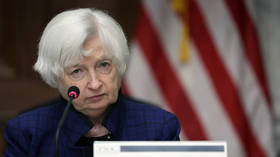Fitch puts US credit rating on downgrade watch

The Fitch credit rating agency has warned that the US could soon lose its AAA score, saying Washington may be unable to pay its bills within a matter of days amid “debt ceiling brinkmanship” in Congress.
The firm said it placed the United States on “Rating Watch Negative” on Wednesday night, pointing to the fast-approaching debt ceiling, which the Treasury Department says could be reached as soon as June 1.
While Fitch noted that it expects lawmakers to strike a deal on the borrowing limit before it is too late, it added that the government could nonetheless “begin to miss payments on some of its obligations,” which is “unlikely to be consistent with a 'AAA' rating.”
“Similarly, avoiding default by non-conventional means such as minting a trillion-dollar coin or invoking the 14th amendment is unlikely to be consistent with a 'AAA' rating and could also be subject to legal challenges,” the agency warned.
A rating downgrade would have major implications for the US economy and the country’s global financial standing, potentially meaning increased borrowing costs, weakened investor confidence and greater economic volatility, as financial markets are highly sensitive to changes in credit ratings.
Republicans and Democrats have struggled to reach an agreement to raise the debt ceiling for weeks, prompting warnings from Treasury Secretary Janet Yellen that the US is “highly likely” to default if Congress does not act soon. The move would be a first in American history, as the government has never defaulted on its debt, which has ballooned to more than $31 trillion.
The Treasury has taken “extraordinary measures” to meet federal obligations since January, but says it will run out of options by early June.
Debt ceiling talks between President Joe Biden and House Speaker Kevin McCarthy have continued this week, but reportedly hit a “speed bump” on Wednesday, according to an unnamed Democratic staffer cited by NBC. The official said negotiations had stalled as Republicans seek major spending cuts, with McCarthy previously stating his party would like next year’s budget to be smaller than 2023’s.
Addressing reporters later on Wednesday, the House speaker said the two sides are “still far apart,” but voiced hopes that a deal could be reached before next week, insisting “we’re not going to default.”















